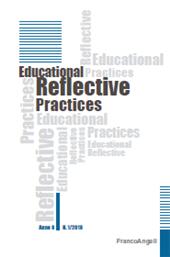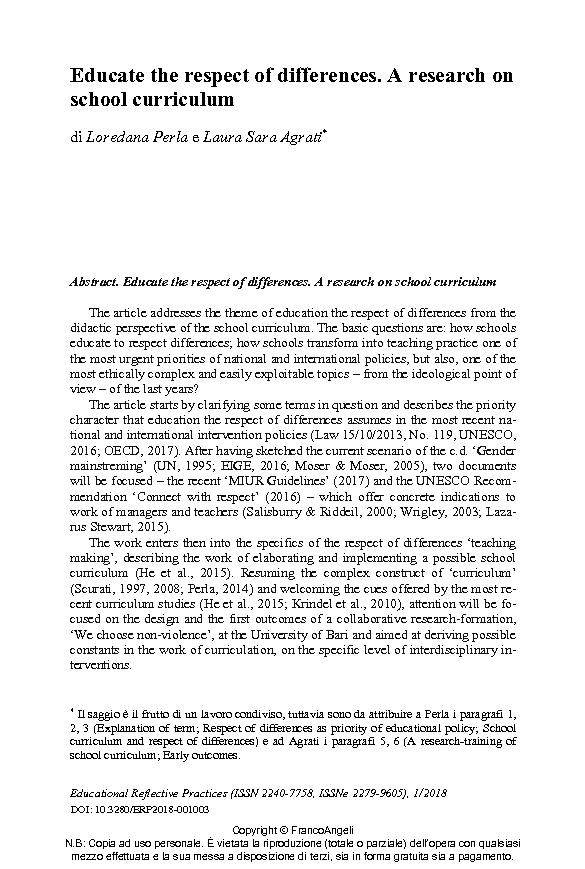2018 - Franco Angeli
Article
Digital Version
Télécharger | Copier/coller | Impression
Educate the respect of differences : a research on school curriculum
25-51 p.
- The article addresses the theme of education the respect of differences from the didactic perspective of the school curriculum. The basic questions are: how schools educate to respect differences; how schools transform into teaching practice one of the most urgent priorities of national and international policies, but also, one of the most ethically complex and easily exploitable topics - from the ideological point of view - of the last years?article starts by clarifying some terms in question and describes the priority character that education the respect of differences assumes in the most recent national and international intervention policies (Law 15/10/2013, No. 119, UNESCO, 2016; OECD, 2017). After having sketched the current scenario of the c.d. 'Gender mainstreming' (UN, 1995; EIGE, 2016; Moser & Moser, 2005), two documents will be focused - the recent 'MIUR Guidelines' (2017) and the UNESCO Recommendation 'Connect with respect' (2016) - which offer concrete indications to work of managers and teachers
- (Salisburry & Riddeil, 2000; Wrigley, 2003; Lazarus Stewart, 2015)-. The work enters then into the specifics of the respect of differences 'teaching making', describing the work of elaborating and implementing a possible school curriculum (He et al., 2015). Resuming the complex construct of 'curriculum' (Scurati, 1997, 2008; Perla, 2014) and welcoming the cues offered by the most recent curriculum studies (He et al., 2015; Krindel et al., 2010), attention will be focused on the design and the first outcomes of a collaborative research-formation, 'We choose non-violence', at the University of Bari and aimed at deriving possible constants in the work of curriculation, on the specific level of interdisciplinary interventions.im is to suggest to the didactic research some evidence based discussion contents in order to corroborate or refute the sometimes surreptitious statements (Peeters, 2012) on the topic;
- to schools, educational and didactic intervention crite-ria consistent with general policies, scientifically founded but above all humanly useful. [Publishers' text].
Fait partie de
Educational reflective practices : 1, 2018-
Informations
Code DOI : 10.3280/ERP2018-001003
ISSN: 2279-9605
-
Dans le même fichier
- Introduzione
- Experience-based learning, apprendimento dall'esperienza e sfide femministe : supportare lo sviluppo dell'identità professionale attraversoiche riflessive collettive
- Educate the respect of differences : a research on school curriculum
- Approcci trasformativi per la formazione alla leadership al femminile
- Leadership femminile e valore trasformativo dell'esperienza
- Differenza, alterità e riconoscimento nell'agire sociale : il caso di studio : donna : parliamone insieme
- Ragioni artistiche della parità e delle differenze di genere
- La vigile e la sindaca : uno studio sul sessismo nella lingua italiana
- Gender Equality Charter Mark : uno strumento per certificare le buone pratiche contro gli stereotipi di genere nella scuola in Europa
- Disaccordo morale e differenza di genere : la Philosophy for Communities come pratica educativa di comunità
- MINDSET : progetto di ricerca intervento per lo sviluppo della competenza senso di iniziativa e imprenditorialità nel territorio della Provinciaaranto
- Genere e segregazione formativa : una ricerca su percorsi accademici atipici
- Recensioni
- Authors



